
COMPREHENSIVE REVIEWS IN FOOD SCIENCE AND FOOD SAFETY
Scope & Guideline
Transforming Food Safety Understanding with In-Depth Analysis
Introduction
Aims and Scopes
- Food Safety and Quality Assurance:
The journal emphasizes the importance of food safety, exploring topics related to microbial contamination, chemical hazards, and innovative technologies for ensuring food quality and safety throughout the supply chain. - Nutritional Science and Health Implications:
Research on the nutritional properties of food components, their interactions with human health, and the potential benefits of bioactive compounds is a core focus area, addressing how food can be optimized for health outcomes. - Innovative Food Processing Technologies:
The journal covers advancements in food processing techniques, including thermal and non-thermal methods, that enhance food quality, safety, and nutritional value, while also exploring sustainable practices. - Functional Foods and Bioactive Compounds:
Exploration of functional foods, their health benefits, and the role of bioactive compounds derived from various food sources is a significant research area, highlighting the relationship between diet and health. - Sustainability and Waste Management:
The journal addresses sustainability in food production and processing, focusing on innovative approaches to reduce waste and valorize byproducts, which is essential for a circular economy in the food sector. - Food Technology and Innovation:
Research on the application of emerging technologies, such as 3D printing, biotechnology, and nanotechnology, in food development and processing is a key area, showcasing how innovation drives the industry forward.
Trending and Emerging
- Emerging Technologies in Food Safety:
Research on the application of cutting-edge technologies, such as artificial intelligence, blockchain, and biosensors, for enhancing food safety and traceability is on the rise, indicating a trend towards more integrated and high-tech solutions. - Plant-Based and Alternative Proteins:
With the growing interest in sustainable diets, there is an increasing focus on plant-based proteins and alternative protein sources, highlighting their nutritional benefits and potential to replace animal-based products. - Food and Gut Microbiome Interactions:
The exploration of how food components affect gut microbiota and overall health is gaining traction, reflecting a broader interest in the connections between diet, microbiome, and disease prevention. - Sustainable Food Production Practices:
Research emphasizing sustainability in food production, including waste reduction and resource-efficient practices, is becoming more prominent, driven by global concerns over food security and environmental impact. - Functional Foods and Personalized Nutrition:
There is a growing trend towards investigating functional foods that offer specific health benefits, as well as personalized nutrition approaches tailored to individual dietary needs and health goals.
Declining or Waning
- Traditional Food Preservation Techniques:
There is a noticeable decrease in publications focused solely on traditional food preservation methods, as research increasingly leans towards modern, innovative techniques that offer enhanced safety and quality. - Conventional Food Authentication Methods:
The focus on traditional authentication methods has waned, with a shift towards advanced technologies such as molecular techniques and biosensors for more accurate and rapid food safety analysis. - Basic Food Chemistry Studies:
Research centered on fundamental food chemistry aspects has declined in favor of applied studies that explore practical applications and health implications of food components. - Market Analysis and Consumer Behavior Studies:
There is a diminishing emphasis on consumer behavior studies related to food choices, as the journal increasingly prioritizes scientific advancements and technological innovations in food science.
Similar Journals
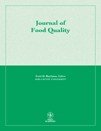
JOURNAL OF FOOD QUALITY
Nurturing Quality and Safety in Food ResearchThe Journal of Food Quality, an esteemed publication under Wiley-Hindawi, stands as a vital resource in the dynamic field of Food Science, established since 1977 and operating under an Open Access model since 2017. With its seat in the United Kingdom, this journal focuses on delivering high-quality research and insights pertaining to food safety, risk management, and quality assurance, reflected in its impressive Q2 ranking in both Food Science and Safety, Risk, Reliability and Quality categories in 2023. Researchers and professionals will find the journal’s contributions indispensable, particularly given its Scopus rankings that place it in the top echelons of its fields, highlighting its impact and relevance. By fostering an environment of knowledge sharing, the Journal of Food Quality not only enhances academic dialogue but also supports innovation and best practices in food research and industry applications.
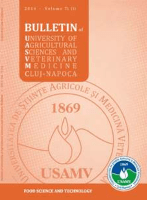
Bulletin of University of Agricultural Sciences and Veterinary Medicine Cluj-Napoca-Food Science and Technology
Cultivating Knowledge for Global Food SystemsBulletin of University of Agricultural Sciences and Veterinary Medicine Cluj-Napoca - Food Science and Technology is a prominent peer-reviewed journal dedicated to advancing the field of food science and technology. Published by the University of Agricultural Sciences and Veterinary Medicine Cluj-Napoca, this open-access journal has been serving the academic community since 2013, promoting the dissemination of high-quality research that addresses pressing issues in food safety, quality, and innovation. With its ISSN 2344-2344 and E-ISSN 2344-5300, the journal aims to bridge the gap between academia and industry by providing a platform for scholars and practitioners to share their findings, insights, and methodologies. Situated in the heart of Romania, the journal reflects the country's rich agricultural heritage and its commitment to enhancing global food systems. By maintaining a rigorous editorial standard, the Bulletin ensures that it remains a vital resource for researchers, industry professionals, and students who are keen to explore the latest developments in food science.
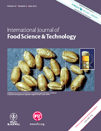
INTERNATIONAL JOURNAL OF FOOD SCIENCE AND TECHNOLOGY
Advancing the Future of Food Science and TechnologyINTERNATIONAL JOURNAL OF FOOD SCIENCE AND TECHNOLOGY, published by WILEY, serves as a premier platform for the dissemination of cutting-edge research in the field of food science and technology. With an ISSN of 0950-5423 and E-ISSN 1365-2621, this journal has been committed to publishing high-quality research since 1966 and is set to continue its impactful contributions through 2024. Recognized for its excellence, it holds a Q1 ranking in Food Science and a Q2 ranking in Industrial and Manufacturing Engineering as of 2023. The journal ranks #95/384 in Industrial and Manufacturing Engineering and #100/389 in Food Science on Scopus, placing it within the top quartiles of these fields. Although it does not currently offer Open Access, researchers and professionals benefit from access to a wealth of knowledge that advances understanding in both applied and theoretical aspects of food science. This journal is indispensable for anyone in the academic and professional domains who seeks to stay abreast of innovations and trends shaping the food industry.
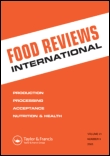
FOOD REVIEWS INTERNATIONAL
Elevating Standards in Food Safety and ProcessingFOOD REVIEWS INTERNATIONAL, published by Taylor & Francis Inc, serves as a pivotal resource within the fields of Food Science and Chemical Engineering. Established in 1985, this esteemed journal offers a comprehensive platform for the dissemination of critical reviews that enhance understanding and innovation in the food industry. With an impressive impact factor reflecting its Q1 quartiles in both Food Science and Chemical Engineering categories, it ranks among the top journals in Scopus, securing the 24th spot in Agricultural and Biological Sciences. Scholars, researchers, and professionals are encouraged to explore its rich content, which spans meticulously reviewed articles that bridge academic research and practical applications, while contributing to advancements in food safety, processing, and sustainability. Although not an Open Access journal, access to its extensive repository is vital for anyone aiming to stay at the forefront of food science advancements.
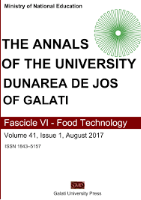
Annals of the University Dunarea de Jos of Galati, Fascicle VI-Food Technology
Navigating the Evolving Landscape of Food TechnologyAnnals of the University Dunarea de Jos of Galati, Fascicle VI-Food Technology is a distinguished academic journal published by GALATI UNIV PRESS, dedicated to advancing knowledge in the field of food technology. With an open access format since 2007, this journal enhances accessibility to research findings and facilitates the dissemination of innovative ideas among researchers, professionals, and students worldwide. The journal holds a noteworthy position in its category, boasting a 2023 Q3 ranking in both Food Science and Industrial and Manufacturing Engineering, indicating its relevance and contribution to these critical fields. As it converges years of publication from 2012 to 2023, it encapsulates an evolving body of knowledge that reflects the latest advancements and research trends. Although it may not yet have a defined HIndex, its presence in Scopus with ranks of #253 in Industrial and Manufacturing Engineering and #278 in Food Science underscores its emerging impact. This journal is particularly significant for those engaged in research related to food technology and engineering, facilitating dialogue and collaboration within the community while addressing pressing challenges and innovations in food processing and safety. With its commitment to quality research, Annals of the University Dunarea de Jos of Galati serves as an essential resource for fostering knowledge and promoting scientific discussion.

Current Research in Food Science
Elevating Standards in Food Science ResearchCurrent Research in Food Science is a leading peer-reviewed academic journal published by Elsevier, specializing in the dynamic field of food science. Since its transition to an Open Access model in 2019, the journal has broadened its reach, contributing significantly to the dissemination of high-quality research. With strong rankings, including a Q1 quartile status in Applied Microbiology and Biotechnology, Biotechnology, and Food Science, it stands out as a pivotal resource for scholars. Based in the Netherlands, current research published within its pages spans a wide range of relevant topics, ensuring that researchers and practitioners stay abreast of the latest advancements. The journal's impressive Scopus rankings enhance its credibility, with a percentile standing in the 74th to 83rd range across relevant categories, underscoring its impact and importance in the academic community. Current Research in Food Science aims to foster the exchange of innovative ideas and foster collaborative efforts among researchers, making it an essential resource for those engaged in advancing the science and technology of food.
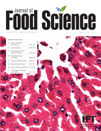
JOURNAL OF FOOD SCIENCE
Uncovering the Secrets of Food Science ExcellenceJOURNAL OF FOOD SCIENCE, published by Wiley, is a premier journal dedicated to advancing the field of food science, bridging the gap between fundamental research and practical application. With an impressive impact factor reflecting its authoritative status, the journal is ranked in the Q1 quartile for Food Science in 2023 and boasts a Scopus ranking of #71 out of 389, placing it in the 81st percentile within Agricultural and Biological Sciences. First launched in 1936, the journal continues to serve as an essential platform for researchers, professionals, and students to disseminate innovative studies and reviews that address critical issues in food quality, safety, and technology. While not currently offering open access, its rigorous peer-review process ensures the dissemination of high-quality and impactful research. Researchers engaged in the vital disciplines of food science will find this journal indispensable for keeping abreast of cutting-edge developments in the field.

Journal of Food Science and Technology-Ukraine
Championing the Future of Food Technology and SafetyJournal of Food Science and Technology-Ukraine, published by the Odesa National University of Technology, stands as a pivotal platform dedicated to the dissemination of high-quality research in the field of food science and technology. With its open access policy established in 2014, the journal fosters global knowledge sharing and accessibility, enabling researchers, professionals, and students to access critical findings and advancements in food technology without barriers. The journal's commitment to publishing innovative studies, reviews, and case analyses reinforces its role in addressing contemporary challenges in food safety, preservation, processing, and nutritional quality. With ISSN 2073-8684 and E-ISSN 2409-7004, it serves as a valuable resource for the academic community, supporting the advancement of food science knowledge and its practical applications.
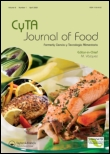
CyTA-Journal of Food
Advancing food science for a sustainable future.CyTA-Journal of Food is a prestigious academic journal published by TAYLOR & FRANCIS LTD, dedicated to advancing the field of food science and technology through the dissemination of innovative research and practical knowledge. With an ISSN of 1947-6337 and an E-ISSN of 1947-6345, this journal stands out with its strong impact factor and is currently placed in the Q2 quartile across multiple categories, including Chemical Engineering, Chemistry, and Food Science, making it a vital resource for researchers and professionals alike. The journal has been an integral part of the academic community since its inception in 2009, and continues to publish cutting-edge articles through to 2024. Its alignment with Scopus ranks further signifies its influence, notably achieving 67th percentile in Industrial and Manufacturing Engineering. As an Open Access journal, it ensures widespread accessibility to its valuable content, promoting collaboration and knowledge sharing among scientists, engineers, and students dedicated to enhancing food safety, quality, and sustainability.

Foods is a premier open access journal published by MDPI, based in Switzerland, that has been at the forefront of disseminating high-quality research in the fields of food science, health professions, and plant science since its establishment in 2012. With an impressive convergence of interdisciplinary studies spanning various aspects of food, nutrition, and microbiology, the journal aims to provide a comprehensive platform for researchers and professionals to share innovative ideas and findings. Maintained as a Q1 journal in multiple categories for 2023, including Food Science and Health Professions, Foods has garnered significant recognition within the academic community, reflected in its strong Scopus rankings and percentiles across various disciplines. The journal not only promotes open access to enhance the visibility and accessibility of research but also encourages the exploration of sustainable food systems and health-related issues, thus contributing to essential discussions in today's society. For those looking to advance their understanding and expertise in food-related sciences, Foods serves as an enduring resource for groundbreaking studies and critical insights.